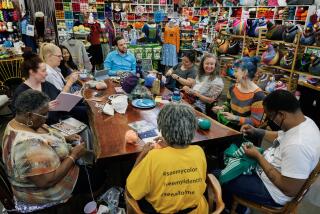UNDERSTANDING THE RIOTS--SIX MONTHS LATER : Money and Power/Making It in the Inner City : LOOKING AHEAD: Visions of Darkness and Hope : ‘We’re crossing over from all those old stereotypes.’
- Share via
There are not too many businesses on the blocks surrounding Bethel African Methodist Episcopal Church. But the 19 people in an upstairs room at the church on South Western Avenue have plans to change all that.
A portfolio or handbag rests alongside almost every occupied seat. Two dog-eared copies of Black Enterprise sit underneath one chair, a copy of American Demographics under another. Income charts are scrawled on the chalkboard. Only nubs of chalk remain.
Shortly after 8 p.m., instructor Doug Lee outlines what he will cover, highlighting key points with a poke of his finger.
His subject is one that has drawn fervid attention in the inner city since the spring riots: how to establish your own business.
Lee stresses the importance of research and marketing and asks the class if anyone has begun developing a plan.
Connie Emelle, sitting front and center, raises her hand. Standing before her classmates--five of whom are her partners--she explains how they intend to market Christmas trees: pre-need sales.
There are already a number of Christmas tree retailers in the area, Emelle says. So her group has devised a prepayment plan to lock in customers early. They will target church congregations and community organizations, hoping to sell 5,000 trees.
“We’re crossing over from all those old stereotypes,” Emelle says after class. “We can be successful.”
Mack Cleveland, 62, comes next. From his seat, he explains an invention that he says was spawned from his days as owner of an auto body shop. “This can take the place of five tools,” he says, holding up a diagram that resembles the cone of an old rocket ship.
Cleveland is now focused on raising capital. “I can put people to work,” he says confidently--a confidence derived, in part, from attending Bethel’s city-funded entrepreneurship training program. “I can now write a proposal. I can project expenses. I don’t have to pay someone for their expertise.”
In the classroom, Lee smiles, seeming pleased that his students are making progress. But with a lot of material to cram into these sessions, he moves on. He speaks of advertising and explains the many ways that companies market themselves. He illustrates this point by mentioning the Taco Bell erected in Compton over a weekend in June--a barn-raising that won the chain ample free publicity.
Students segue to chattering about recent fast-food commercials. But the instructor quickly steers the class back to the lesson at hand. “This is business,” Lee says. “You’ve got to be creative. You want to come up with a slogan or a logo that can generate a positive response in people’s minds.”
Students chime in with their own examples; the discussion bounces around the room. They speak of the familiar advertising campaigns used by corporate giants--how “Uh-huh” and slow ketchup are linked to such companies as Pepsi and Heinz.
“Right! Right!,” Lee exclaims.
At 9:25 p.m., the homework assignments are passed out and the class is dismissed. Emelle and her classmates make their way through the parking lot, the lot that will soon be home to a few thousand Christmas trees--and the birthplace of a business.
More to Read
Inside the business of entertainment
The Wide Shot brings you news, analysis and insights on everything from streaming wars to production — and what it all means for the future.
You may occasionally receive promotional content from the Los Angeles Times.










